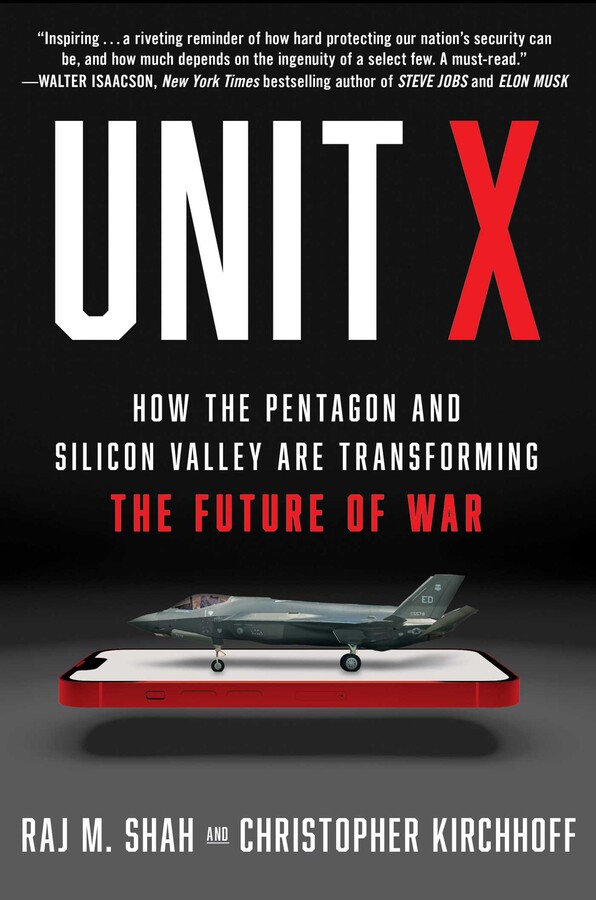Christopher Kirchhoff's new book tells how Unit X brought together Silicon Valley and the US military
An illuminating, behind-the-scenes examination of the numerous, critical, and sometimes competing efforts inside the Pentagon to change the way it does business
General David Petraeus
A Gates Cambridge Scholar has co-authored a book which gives an inside look at Unit X, the elite unit within the Pentagon that brings Silicon Valley’s cutting-edge technology to America’s military.
Christopher Kirchhoff is co-author with Raj M Shah of Unit X: How the Pentagon and Silicon Valley Are Transforming the Future of War, published in the US in July and in the UK in August. The two men know more about Unit X than most as they co-founded it in 2016.
Kirchhoff [2001] had already served as a strategist in President Obama‘s National Security Council and as the civilian assistant to General Martin Dempsey, Chairman of the Joint Chiefs of Staff, when he was appointed by the Secretary of Defense to create and launch the Pentagon’s Silicon Valley Office. There he led 67 civilian and uniformed personnel overseeing over 100 projects piloting advanced commercial technology, from flying cars to microsatellites, in military missions. The unit tested the innovative technology which was used in the air operations software that prevented ISIS from committing genocide as well as space-based Synthetic-aperture radar imaging used to detect North Korean and Russian missile launches.
 Before the unit was set up the Pentagon was known for its uncomfortable relationship with Silicon Valley and for slow-moving processes that acted as a brake on innovation. Unit X was specifically designed as a bridge to Valley technologists that would accelerate bringing state of the art software and hardware to the battle space. Empowered to cut through red tape and function almost as a venture capital firm in order to address immediate military needs, Unit X pioneered a rapid acquisition pathway which is now responsible for $39 billion dollars of technology acquisition by the Department of Defense.
Before the unit was set up the Pentagon was known for its uncomfortable relationship with Silicon Valley and for slow-moving processes that acted as a brake on innovation. Unit X was specifically designed as a bridge to Valley technologists that would accelerate bringing state of the art software and hardware to the battle space. Empowered to cut through red tape and function almost as a venture capital firm in order to address immediate military needs, Unit X pioneered a rapid acquisition pathway which is now responsible for $39 billion dollars of technology acquisition by the Department of Defense.
The book details some of the innovations that came out of the unit, ranging from flying cars that can land like helicopters and artificial intelligence-powered drones that can fly into buildings and map their interiors to microsatellites that can see through clouds and monitor rogue missile sites.
It takes readers inside AI labs, drone workshops, and battle command centres, including in Ukraine, and paints a picture of the role of innovation and technology in geopolitical power.
General David Petraeus, former Director of the CIA, calls it “an illuminating, behind-the-scenes examination of the numerous, critical, and sometimes competing efforts inside the Pentagon to change the way it does business. An exceedingly important book!”
Christopher is a two-time Gates Cambridge Scholar, having done both his MPhil and PhD in Social and Political Science at the University of Cambridge. He was one of the first cohort in 2001 and then stayed on to do his PhD in 2002. Since leaving Cambridge Kirchhoff has authored the White House report on Big Data & Privacy, the NSC after-action report on Ebola, the Space Shuttle Columbia Accident Investigation report, and the US government history Hard Lessons: The Iraq Reconstruction Experience. He was awarded the Secretary of Defense Medal for Outstanding Service and the Civilian Service Medal for hazardous duty in Iraq.
*Unit X: How the Pentagon and Silicon Valley Are Transforming the Future of War is due out on 9th July in the US and will be launched in the UK in August. More information: www.unitxbook.com. Picture credit: DoD photo by Master Sgt. Ken Hammond, U.S. Air Force, courtesy of Wikimedia commons.












